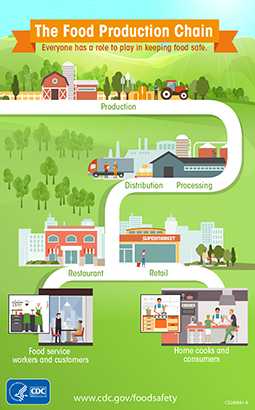Preventing Future Outbreaks

See larger image
Prevention Involves Many Partners from Farm to Table
The ultimate goal for public health and food safety officials is not just stopping foodborne disease outbreaks once they occur, but preventing them from happening in the first place. Long-term prevention of foodborne outbreaks takes the actions of many partners in the food production chain, stretching from farm to table. Here are examples of some prevention measures at each level:
- Producing and harvesting food
- Quality assurance programs at egg farms
- Safe agricultural practices for produce farmers
- Efforts to keep shellfish harvest beds free of sewage contamination
- Processing foods
- Inspection systems at meat processing plants
- Use of pasteurization, canning, cooking, irradiation, and other steps to kill pathogens in food processing
- Distributing and preparing foods
- Buyer specifications for food safety in food purchasing contracts
- Training for restaurant managers and food workers about food safety and sanitation measures
- Proper hand-washing procedures and facilities
- Encouraging food workers not to work when they are ill, for example by providing paid sick leave
- Food safety education for consumers
Role of Outbreak Investigations in Prevention
Outbreak investigations help stop ongoing outbreaks and keep people from getting ill now. They also play a key role in preventing foodborne diseases. Investigations may find new pathogens, new food vehicles, and unsuspected gaps in the food safety system. They can improve scientific understanding of how the contamination occurred at specific points in the food supply chain, of the chances that it may occur again, and how it may be reduced or prevented. Often outbreak investigations raise questions that lead to new research to better understand how contamination occurs and how it can be prevented or reduced.
Outbreak investigations are also opportunities for different authorities and professionals to work together as a team. They may reveal points at which the public health systems that detect and respond to outbreaks can be improved.
Outbreak investigations and additional research should result in better industry practices, better regulations and enforcement by the regulatory agencies, and better consumer understanding, all of which should reduce the number of foodborne illnesses that occur.
Visit CDC’s Food Safety Vital Signs Reports to learn what can be done to prevent foodborne illness and outbreaks.
- Page last reviewed: March 24, 2015
- Page last updated: March 24, 2015
- Content source:


 ShareCompartir
ShareCompartir